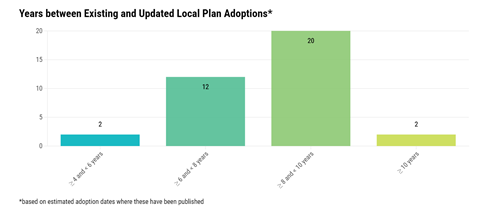Only 7% of local authorities studied updated their local plan following statutory review
Only four out of 55 local authorities have adopted an updated local plan as part of their statutory five-year review of the document, according to research by Lichfields.
The planning and development consultancy found that while 47 out of 55 (85%) local authorities that adopted a local plan in 2016/17 and 2017/18 complied with the requirement to review their local plans within five years, so far only 7% of them adopted an updated local plan as a result.

The report said that “while the National Planning Policy Framework (NPPF) was meant to address the problem of outdated local plans by requiring a review of plans every five years, the new research has found that this process is not operating effectively”.
It added that as there is no set timescale within which a plan must be updated following a statutory review, this can result in delays in updating local plans.
Lichfields noted that there was “minimal guidance” on what circumstances would require a local plan to be updated.
In almost 10% of cases, it found that local authorities concluded that no update was required.
The report added that for the eight local authorities that did not comply with the legal requirement to complete a five-year local plan review, “there did not seem to be any consequence”.
The NPPF states that a local plan review should take place “at least once every five years” and that policies “should then be updated if necessary”.
It also says that changes to the local plan should be made if a local authority’s “applicable local housing need figure has changed significantly”.
According to government data, preparing a local plan takes an average of seven years.
During his speech announcing the new National Planning Policy Framework before Christmas, Michael Gove said that he would “call out” local authorities that fail to publish their local plans and threatened to intervene further if necessary.
Lichfields’ research noted that a significant proportion of local authorities reviewed their plans towards the end of the statutory five-year period.
This means that if the local authorities were to take an average of seven years to prepare an updated plan, it would be 12 years between respective plan adoptions.

Lichfields’ research from July 2023 found that 67% of local plans were out of date, and that this would rise to 75% by the end of 2025 without “immediate action from the Government”.
The report highlighted that uncertainty around plan-making reforms due in Autumn 2024 is ”inadvertently delaying plan updates and undermining the review process”.
>> See also: More councils halt local plans in wake of Gove planning climbdown
>> See also: Government proposes three-check system for local plans
Simon Coop, senior director at Lichfields, said: “The intention of the plan-making reforms is to encourage a more rolling rhythm of updates, ensuring plans and their evidence are routinely kept up to date. However, the proposed reforms are currently having the opposite effect.”
Currently, local authorities are expected to continue to update their plans under the current guidance, against a deadline for submitting plans for examination under the current legal framework of 30 June 2025.
According to Lichfields, some local authorities are already referring to this as ”an unworkable deadline”.
To avoid this, Lichfields said the transitional period would need to be extended for authorities that commence preparation of a plan before the new regulation, policy and guidance is published in Autumn 2024.










No comments yet